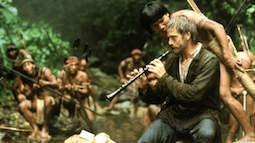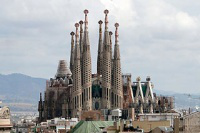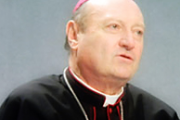Cardinal pays tribute to Ennio Morricone - a man of faith

Jeremy Irons as Father Gabriel in The Mission image: Goldcrest Films
Source: Vatican News/ICN
The President of the Pontifical Council for Culture, Cardinal Gianfranco Ravasi, has paid tribute to the legendary Italian composer Ennio Morricone, who died today in Rome at the age of 91 after a fall ten days ago.
Born in Rome, on 10 November 1928, Ennio Morricone was the son of Libera Ridolfi and trumpeter Mario Morricone, and had four siblings. He began playing and writing music from the age of six.
He entered the National Academy of St Cecilia in 1940 at the age of 12, enrolled in a four-year harmony program which he completed within six months. In 1941, Morricone was chosen from the students of the Academy, to be a part of the Orchestra of the Opera directed by Carlo Zecchi. In 1946, he received his diploma in trumpet playing. After his graduation, he continued to work in classical composition and arrangement.
In his decades-long career Morricone wrote the scores for more than 400 films, working across all film genres. His soundtracks are among the most famous in the history of cinema. He was closely linked to the film director Sergio Leone, whom he first met in primary school. Together they created some of the most famous Spaghetti Westerns including A Fistful of Dollars (1964), For a Few Dollars More (1965), The Good, the Bad and the Ugly (1966), starring Clint Eastwood, and Once Upon a Time in the West (1968).
Morricone won his Oscar for his work on Quentin Tarantino's The Hateful Eight in 2015 and was nominated for his original scores for Terrence Malick's Days of Heaven (1978), Roland Joffe's The Mission (1986), Brian De Palma's The Untouchables (1987), Barry Levinson's Bugsy (1991) and Giuseppe Tornatore's Malena (2000). In 2007, he received an honorary Oscar for his "magnificent and multifaceted contributions to the art of film music".
Morricone's score for the Mission, evoking the music of the 18th century Spanish Jesuit missions in Paraguay, is one of his most popular works with a Catholic theme. He also composed the music for 1983 film, The Scarlet and the Black, starring Gregory Peck, based on the story of Mgr Hugh O'Flaherty a Catholic priest who saved the lives of thousands of Jews and escaped Allied PoWs in Rome during the Second World War.
Morricone lived in Italy his entire life and never desired to live in Hollywood.
Sharing his memories of the late composer with Vatican News' Giancarlo La Vella, Cardinal Gianfranco Ravasi recalled that Ennio Morricone was a man of strong faith.
The President of the Pontifical Council for Culture said he would remember this great cinematic composer for a least two particular spiritual events.
The first, Cardinal Ravasi recalled, was in Poland when he was preparing an Oratory for Pope St John Paul II. "The second event is the most recent meeting on 15 April 2019, when I presented him, in the name of Pope Francis, with the Pontifical Gold Medal for his musical work. These two moments testify to what he has always attested: his faith."
The Cardinal went on to say that there was always a religious and spiritual dimension to the composer's music, whether he was scoring a film like "The Mission" or a western.
Cardinal Ravasi said, with the music of Morricone, the score was the protagonist, along with the screen images. Elaborating on this, Cardinal Ravasi said he once invited Morricone to speak during a plenary session on the theme of beauty, starting from his experience as a musician.
"If we review the films of which Ennio Morricone composed the soundtrack, it is almost spontaneous to remember, not only the visual dimension, but also the sound dimension. There is a musical thread, which goes hand in hand with that of the image."
In particular, Cardinal Ravasi mentioned the film "The Mission" in which, he said, the musical commentary is of a religious nature and illustrates the theme of the film.
"That is why I believe that we should all be grateful to Ennio Morricone ... for having been able to express the ineffable and the invisible at the same time, which are the soul of religion."
Morricone was married to Maria Travia for more than 64 years. The met in 1950 and married on 13 October 1956. Maria wrote lyrics to complement her husband's pieces. Her works include the Latin texts for The Mission. They had three sons and a daughter: Marco (1957), Alessandra (1961), the conductor and film composer Andrea (1964), and Giovanni Morricone (1966), a filmmaker, who lives in New York City.
In a moving text, issued after his death, Morricone thanked his family and close friends for their companionship, naming his children and grandchildren and saying: "I hope they understand how much I loved them."
He dedicated "the most painful goodbye" to his wife saying: "to her I renew the extraordinary love that bound us together and I am sorry to abandon."
Morricone said he wanted a private funeral because "I don't want to disturb."


















